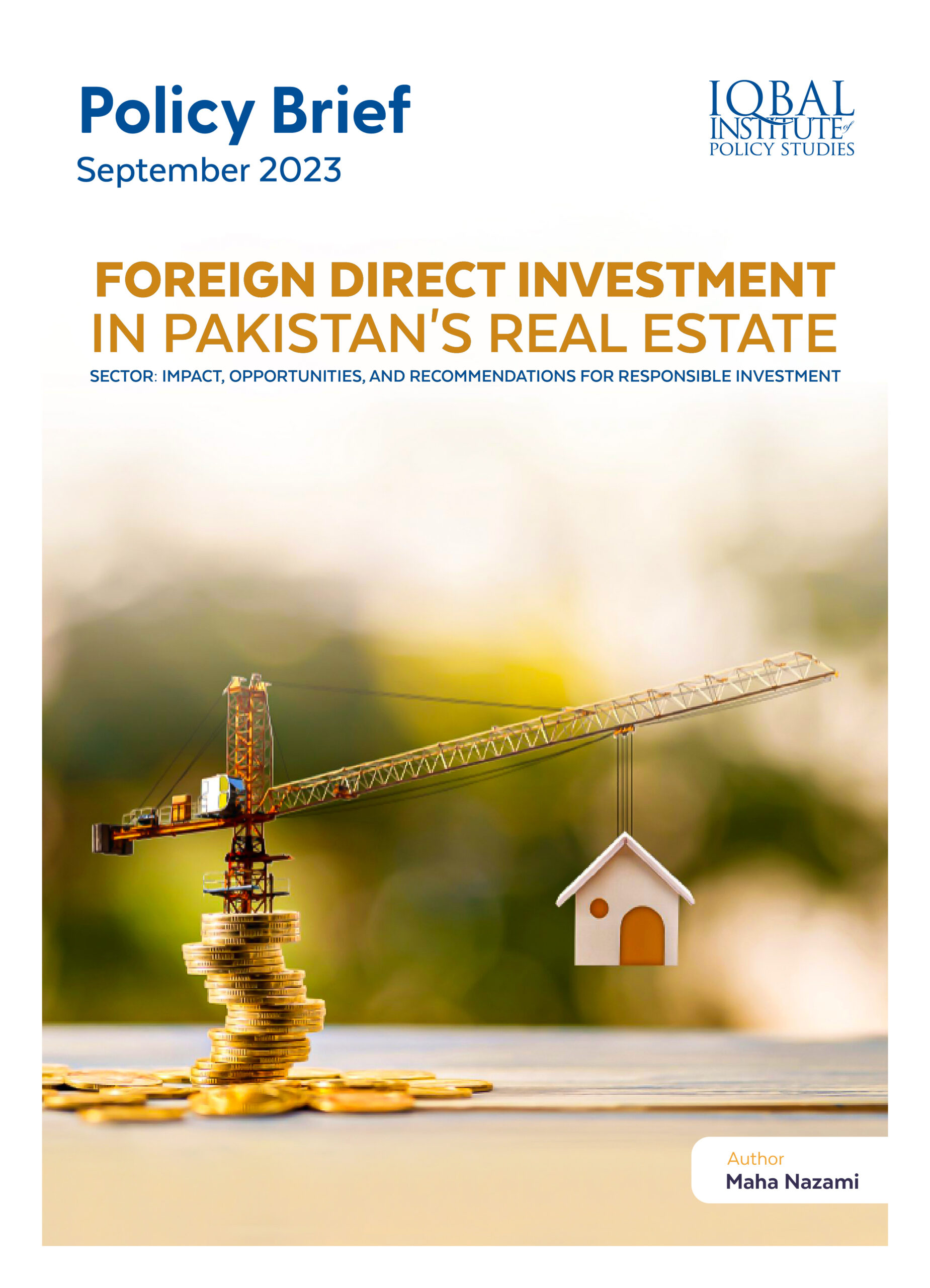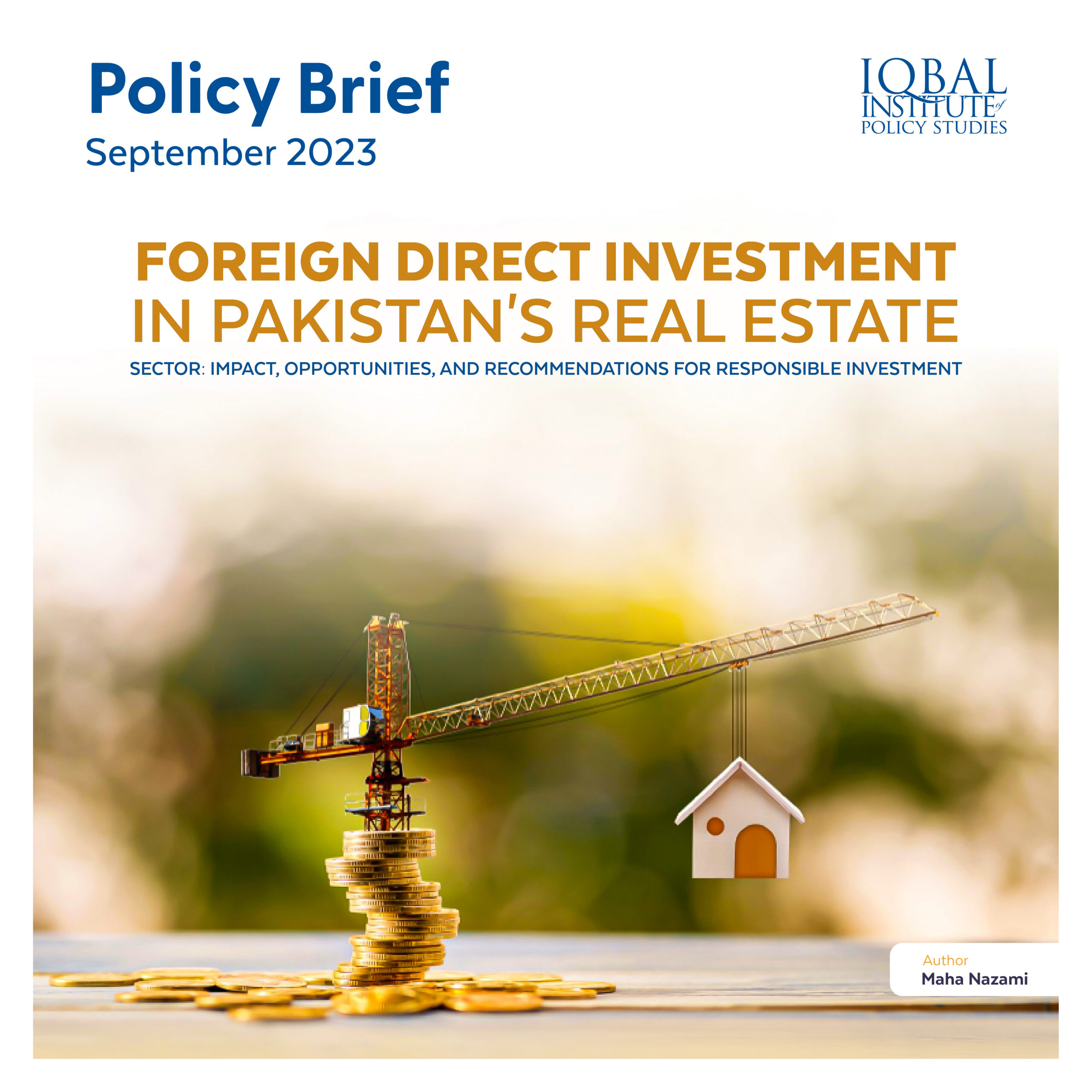Foreign Direct Investment (FDI) plays a crucial role in Pakistan’s economic development, and the real estate sector is no exception. This policy brief aims to analyze the impact of FDI in Pakistan’s real estate sector, considering its contribution to economic growth and potential risks. Furthermore, it provides recommendations to attract responsible foreign investment, fostering sustainable growth and safeguarding national interests.
Introduction
Foreign Direct Investment (FDI) stands as a powerful driver of economic growth and development in nations across the globe. In Pakistan, a country with immense economic potential and a burgeoning real estate sector, the role of FDI has become increasingly prominent. The real estate sector, characterized by its capacity to shape urban landscapes, provide housing solutions, and stimulate infrastructure development, has become a focal point for both domestic and foreign investors.
This policy brief delves into the multifaceted relationship between FDI and Pakistan’s real estate sector. It aims to scrutinize the impact of FDI on the real estate landscape, dissecting the contributions it has made to economic growth, housing development, and technological advancements. Moreover, it addresses the associated risks, such as property speculation, money laundering, and environmental degradation, that necessitate a nuanced approach to foreign investment regulation.
As Pakistan continues to position itself as an attractive investment destination, it is imperative to strike a balance between welcoming foreign capital and safeguarding national interests. This policy brief endeavors to provide a comprehensive analysis of the situation, offering recommendations and policy frameworks aimed at attracting responsible foreign investment that aligns with Pakistan’s long-term economic stability and sustainable development goals. In doing so, Pakistan can capitalize on the opportunities presented by FDI in its real estate sector while mitigating potential pitfalls and fostering an environment conducive to equitable growth and prosperity.
Impact of Foreign Direct Investment (FDI) in Pakistan’s Real Estate Sector:
-
Economic Growth
– Stimulating Construction: FDI injections into the real estate sector have led to a surge in construction activities. Foreign investors, often partnering with local developers, finance and undertake large-scale construction projects such as residential complexes, commercial centers, and mixed-use developments. These projects create a substantial demand for labor and raw materials, thereby boosting employment and economic activity in the construction sector.
– Infrastructure Development: FDI not only fuels real estate construction but also contributes to the development of vital infrastructure. Many real estate projects necessitate the creation or enhancement of roads, utilities, and public amenities in the surrounding areas. These investments in infrastructure further catalyze economic growth by improving connectivity and accessibility, attracting additional businesses, and enhancing the overall quality of life.
– Job Creation: The real estate sector is labor-intensive, providing job opportunities for a diverse workforce, from architects and engineers to construction workers and administrative staff. FDI inflows increase the demand for skilled and unskilled labor, leading to increased employment opportunities. The resultant rise in household income, in turn, generates higher consumer spending, which fuels economic growth.
– Diversifying the Market: International real estate developers and investors bring diverse perspectives, innovative design concepts, and global best practices to the Pakistani market. This diversification introduces new types of real estate products and services, catering to different segments of the population. It not only widens the consumer base but also fosters healthy competition among domestic and foreign players, driving market innovation.
-
Housing Development
– Addressing Housing Shortages: Pakistan has long grappled with a shortage of affordable housing. FDI has played a pivotal role in mitigating this crisis by supporting the development of affordable housing projects. International investors often collaborate with local developers to build housing units that are accessible to a wider range of income groups. These projects aim to provide quality housing solutions to Pakistan’s growing urban population.
– Improving Living Conditions: FDI-driven housing projects prioritize modern amenities and quality construction standards, resulting in improved living conditions for residents. These developments offer better access to basic services like clean water, sanitation, and electricity, thereby enhancing the overall quality of life for residents. The availability of safe and affordable housing options helps reduce homelessness and housing insecurity.
– Rural and Urban Development: FDI is not limited to urban centers. It has also started to flow into rural areas, promoting balanced regional development. In rural settings, FDI-driven housing projects can provide modern housing solutions, improve infrastructure, and create employment opportunities, fostering inclusive growth and reducing urbanization pressures.
-
Technology Transfer
– Modern Construction Technologies: International investors often introduce modern construction technologies and practices that may not have been widely adopted in Pakistan. These technologies can include innovative building materials, energy-efficient design, and sustainable construction practices. As a result, FDI contributes to raising the overall efficiency and quality of construction in the country, potentially reducing construction costs and timelines.
– Skills Enhancement: Collaborations with international investors and developers provide opportunities for local construction professionals to learn and adopt best practices from around the world. This knowledge transfer can enhance the skill set of local architects, engineers, and construction workers, ensuring that Pakistan’s real estate industry remains competitive and capable of delivering high-quality projects.
– Innovation and Sustainability: FDI often encourages the adoption of environmentally friendly and sustainable building practices. International investors may prioritize green building certifications, energy-efficient designs, and waste reduction strategies, which can contribute to a more sustainable and environmentally responsible real estate sector in Pakistan.
These elaborations illustrate how FDI in Pakistan’s real estate sector has multifaceted positive impacts, ranging from economic growth and housing development to the introduction of advanced construction technologies and sustainability practices. These benefits, however, must be balanced with effective regulatory measures to ensure responsible and sustainable foreign investment in the sector.
Potential Risks Associated with FDI
- Speculation and Property Bubble: Unregulated FDI can lead to property speculation and price bubbles, making housing unaffordable for the local population.
- Money Laundering: The real estate sector can be susceptible to money laundering activities through FDI, undermining the country’s financial integrity.
- Environmental Concerns: Inadequate environmental regulations may result in unsustainable development practices, leading to adverse environmental impacts.
Challenges faced by Foreign Direct Investment (FDI) in Pakistan’s real estate sector:
Regulatory Complexity
– Multiple Approvals: Real estate development often requires numerous approvals, permits, and licenses at various levels of government, from local to federal. Navigating this intricate web of regulations can be time-consuming and costly for foreign investors.
Ownership and Title Issues
– Ambiguous Titles: Ambiguities in property ownership and land titles can result from historical factors, leading to disputes over land. The absence of a centralized and digitized land registry system makes it difficult to verify property ownership and history accurately.
Transparency and Corruption
– Opaque Transactions: Lack of transparency in property transactions can create opportunities for corruption and bribery. Bureaucratic red tape may necessitate unofficial payments to expedite processes, which can be a deterrent for foreign investors seeking transparent and fair dealings.
Access to Financing
– Limited Financing Options: Foreign investors may face challenges in securing financing for real estate projects due to strict lending criteria and a lack of well-developed financial instruments like mortgage markets and real estate investment trusts (REITs). This can limit the availability of capital for investments.
Infrastructure and Utility Costs
– High Operational Costs: High utility costs, including electricity and gas, can significantly increase the operational expenses of real estate projects. Inconsistent utility services may lead to delays and additional costs in project execution.
Foreign Exchange Risks
– Currency Fluctuations: Exchange rate fluctuations can impact the returns on foreign investments. Sudden devaluations can reduce the value of investments and create uncertainty for foreign investors.
Political Instability
– Uncertainty: Political instability and frequent changes in government can create an uncertain investment climate. Foreign investors may be concerned about the stability of contracts and property rights in such environments.
Security Risks
– Regional Variations: Security risks can vary across regions in Pakistan. Investors may be reluctant to invest in areas with a history of security issues, limiting investment opportunities and potentially leading to uneven development.
Market Oversaturation
– Price Stagnation: In urban areas, oversaturation of certain types of real estate projects can lead to increased competition, which may result in price stagnation or even declines. Oversaturation can also impact the feasibility of new projects.
Environmental Regulations
– Inconsistent Enforcement: Inconsistent enforcement of environmental regulations can lead to concerns about unsustainable construction practices and potential environmental liabilities. Investors may be uncertain about compliance requirements.
Legal Disputes and Delayed Justice
– Legal Battles: Lengthy legal disputes related to property rights, contractual agreements, or regulatory matters can tie up investments for years. Delays in the legal system can lead to additional costs and hinder project progress.
Infrastructure Deficiencies
– Investment Requirements: The need for infrastructure development can place an additional financial burden on investors. Inadequate road networks, water supply, and sewage systems can affect the feasibility of real estate projects.
Taxation and Repatriation of Profits
– Complex Taxation: The complexity of taxation rules, including property taxes and capital gains taxes, can create challenges for foreign investors. Understanding and complying with tax laws may require expert advice, adding to the cost of investments.
Addressing these challenges will require a comprehensive approach, including regulatory reforms to simplify processes, improvements in transparency and land registration, infrastructure development, and measures to enhance security and stability. By addressing these challenges, Pakistan can create a more attractive environment for FDI in the real estate sector, promoting economic growth and development.
Recommendations for Responsible Foreign Investment
- Strengthen Regulatory Framework: Enhance and enforce regulatory frameworks governing FDI in the real estate sector, ensuring transparency and accountability in property transactions.
- Monitoring and Compliance: Establish a robust monitoring system to track FDI inflows, property transactions, and investor compliance with local laws and regulations.
- Affordable Housing Requirements: Encourage foreign investors to allocate a portion of their investments to affordable housing projects, addressing the housing shortage and promoting social equity.
- Environmental Sustainability: Implement stringent environmental regulations to mitigate the environmental impact of real estate development, and incentivize sustainable construction practices.
- Anti-Money Laundering Measures: Strengthen anti-money laundering measures in the real estate sector, including comprehensive due diligence checks on foreign investors.
- Public-Private Partnerships (PPP): Promote PPPs in real estate development projects to leverage foreign expertise, technology, and capital while ensuring alignment with national development goals.
- Investor Education: Facilitate investor education programs to make foreign investors aware of local regulations, market conditions, and community needs.
- Data Transparency: Improve data collection and transparency in the real estate sector to provide accurate information on market trends and property transactions.
Conclusion
Foreign Direct Investment (FDI) in Pakistan’s real estate sector has the potential to be a catalyst for significant economic growth and housing development. FDI stimulates construction, infrastructure development, and job creation, diversifying the market by attracting international investors with innovative practices and expertise. It also addresses Pakistan’s persistent housing shortage, fostering the development of affordable housing projects and improving living conditions. Additionally, FDI introduces modern construction technologies and practices, enhancing efficiency and skills in the local industry. However, there are challenges such as regulatory complexity, transparency issues, and environmental concerns, along with political instability, security risks, and legal disputes that can deter investors. To maximize the benefits and mitigate risks, Pakistan must streamline regulations, improve transparency, enforce sustainability standards, ensure security and stability, educate investors, and enhance data transparency. By doing so, Pakistan can attract responsible foreign investment in the real estate sector, safeguard national interests, and ensure long-term economic stability and sustainable development.
References
https://www.worldfinance.com/markets/foreign-investment-is-carving-out-a-new-landscape-in-pakistan
https://propakistani.pk/2022/07/26/foreign-direct-investment-in-real-estate-sector-declined-in-fy22/
https://dailytimes.com.pk/1124989/pakistan-has-potential-to-attract-fdi-in-real-estate-tarek-hamdy/
https://southasianvoices.org/pakistans-investment-climate-the-fdi-problem/



Leave a Reply